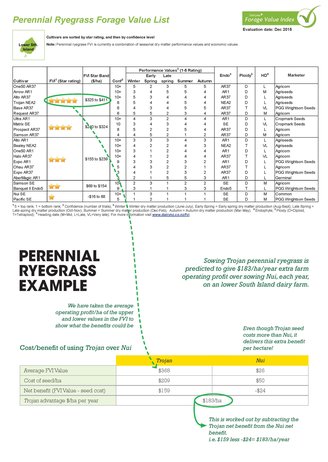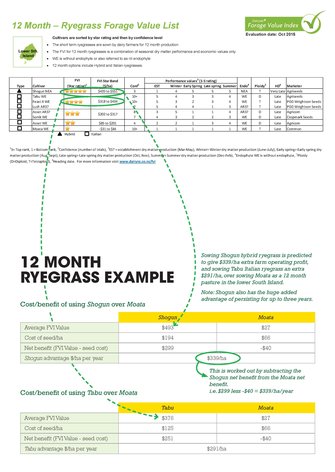New Zealand
February 25, 2016
DairyNZ has recently released its latest rankings for the Forage Value Index (FVI), the independent, region specific, profit-based index for short-term and perennial ryegrass cultivars.
Launched in 2013, the FVI is the best system available for providing information about different pasture options.
It provides $/ha values on the predicted extra operating profit to a dairy farm of sowing different ryegrass cultivars over a genetic base (1996 cultivars).
Economic values for a ‘typical’ dairy farm have been estimated for seasonal dry matter production for winter, early spring, late spring, summer and autumn.
The Cultivar Selector allows you to select cultivars that are expected to maximise profit based on their seasonal DM yield.
For the purpose of the FVI, NZ is divided into four regions – upper and lower North Island, and upper and lower South Island. Each has its own seasonal DM economic values that reflect different values of additional feed by region.
This year, Agriseeds is proud to become the first company to have a top ranking, five star ryegrass in all categories of the FVI, in every region of the country.
We’ve also published Champions of the FVI booklets, one for each of the four FVI regions, to help pick the cultivars that are most profitable in each part of the country. These handy A5 booklets explain how to interpret the different rankings and dollar values for each cultivar in terms of your own farm.
If you’d like a copy of Champions of the FVI for your region, dowload it here.
And remember, using the right pasture genetics is one of the keys to successful pasture renewal during low payout years, along with upgrading the right paddocks, and using the right renewal technique that suits the farm and the soils.
Bargain seed is always available but a basic rule is you get what you pay for, and seed is no exception. Saving $100/ha on cheap pasture seed can end up costing much more, through poor germination, high weed content, minimal endophyte or simply poor genetics.

